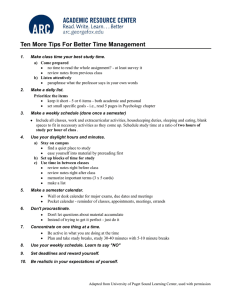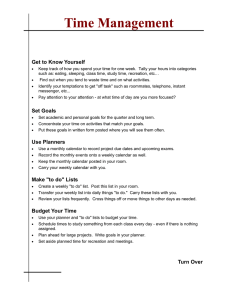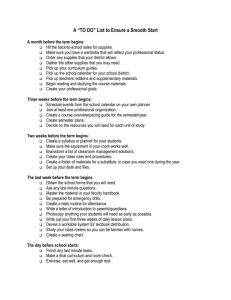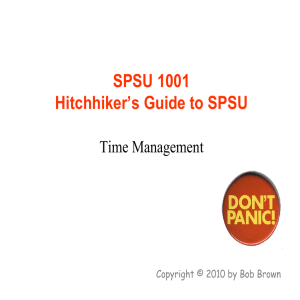Time Management Worksheet
advertisement
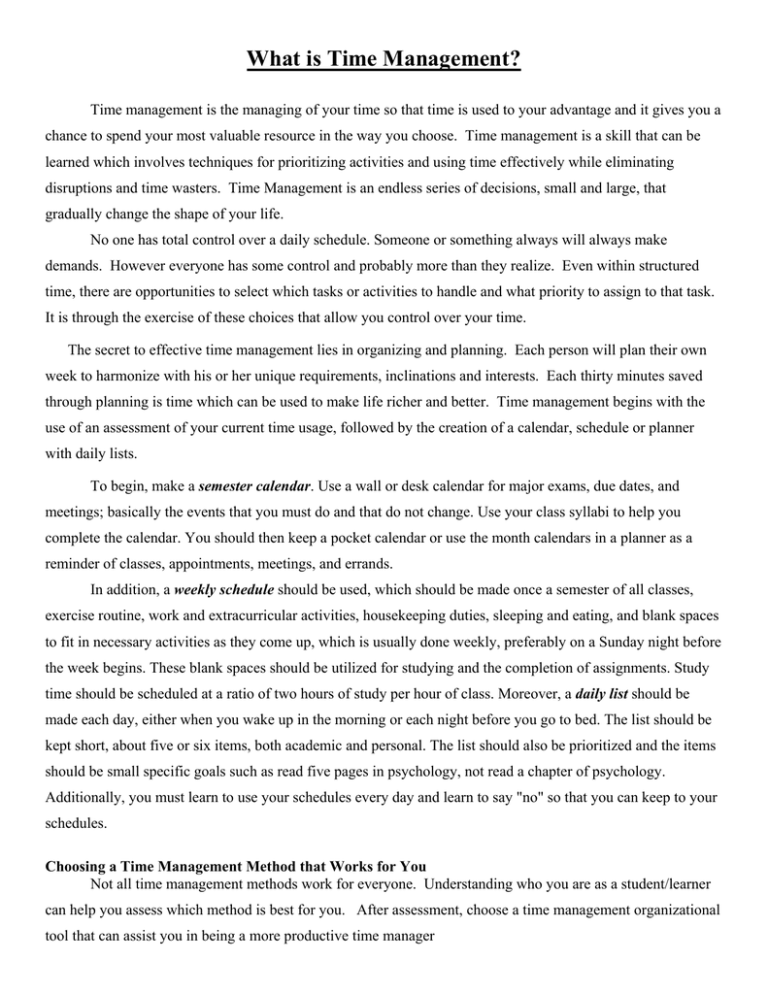
What is Time Management? Time management is the managing of your time so that time is used to your advantage and it gives you a chance to spend your most valuable resource in the way you choose. Time management is a skill that can be learned which involves techniques for prioritizing activities and using time effectively while eliminating disruptions and time wasters. Time Management is an endless series of decisions, small and large, that gradually change the shape of your life. No one has total control over a daily schedule. Someone or something always will always make demands. However everyone has some control and probably more than they realize. Even within structured time, there are opportunities to select which tasks or activities to handle and what priority to assign to that task. It is through the exercise of these choices that allow you control over your time. The secret to effective time management lies in organizing and planning. Each person will plan their own week to harmonize with his or her unique requirements, inclinations and interests. Each thirty minutes saved through planning is time which can be used to make life richer and better. Time management begins with the use of an assessment of your current time usage, followed by the creation of a calendar, schedule or planner with daily lists. To begin, make a semester calendar. Use a wall or desk calendar for major exams, due dates, and meetings; basically the events that you must do and that do not change. Use your class syllabi to help you complete the calendar. You should then keep a pocket calendar or use the month calendars in a planner as a reminder of classes, appointments, meetings, and errands. In addition, a weekly schedule should be used, which should be made once a semester of all classes, exercise routine, work and extracurricular activities, housekeeping duties, sleeping and eating, and blank spaces to fit in necessary activities as they come up, which is usually done weekly, preferably on a Sunday night before the week begins. These blank spaces should be utilized for studying and the completion of assignments. Study time should be scheduled at a ratio of two hours of study per hour of class. Moreover, a daily list should be made each day, either when you wake up in the morning or each night before you go to bed. The list should be kept short, about five or six items, both academic and personal. The list should also be prioritized and the items should be small specific goals such as read five pages in psychology, not read a chapter of psychology. Additionally, you must learn to use your schedules every day and learn to say "no" so that you can keep to your schedules. Choosing a Time Management Method that Works for You Not all time management methods work for everyone. Understanding who you are as a student/learner can help you assess which method is best for you. After assessment, choose a time management organizational tool that can assist you in being a more productive time manager Organizational & Time Management Tools In order to accomplish your goals you will need to use Organizational and time Management Tools Which Planner is right for you? Tech PDA Palm Pilot Blackberry Computer Scheduling Programs (e.g. Outlook) Schedules/Calendars Daily Planning • To Do Lists Weekly Calendar Semester Calendar 4-Year Plan Monthly Calendar Semester on a Page Use a General Course Catalog Meet with an advisor Seven Hints On Time Planning 1. Build your schedule around your commitments. Some activities have fixed time requirements and others are flexible. The most common which you must consider are: o FIXED: classes, eating, organizations, church, employment o FLEXIBLE: sleeping, study, recreation, personal grooming 2. Plan sufficient study time to do justice to each subject. Most college classes are planned to require about two hours of outside work per week per credit. By multiplying your credit load by two you can get a good idea of the time you should provide for studying. Of course, if you are a slow reader, or have other study deficiencies, you may need to plan more time in order to meet the competition from your classmates. Break assignments into smaller segments, such as library research, read articles & take notes, rough draft, edit paper, final draft. Break study tasks into smaller segments, such as: read chapter, outline chapter, make note cards, study note cards, review for exam. 3. Study at a regular time and in a regular place. Establishing habits of regularity in studying is extremely important. Knowing what you are going to study, and when, saves a lot of time in making decisions, finding necessary materials, etc. Avoid generalizations is your schedule such as "study". Commit yourself more definitely to "study history' or "study chemistry" at certain hours. 4. Study as soon after class as possible. Check over lecture notes while they are still fresh in your mind. Start assignments while your memory of the assignment is still accurate. Remember, one hour of study immediately after class is probably better than two hours of study a few days later. 5. Utilize off hours for study. Those scattered one or two hours free periods between classes are easily wasted. Using them for study will result in free time for recreational activities later on. 6. Study no more than two hours on any one course at one time. After studying for two hours you begin to tire and your ability to concentrate decreases rapidly. To keep up your efficiency, take a break and then switch to studying another subject. 7. Borrow time-don't steal it. Whenever an unexpected activity arises that takes up time you had planned to use studying, decide immediately where you can trade for "free" time to make up the missed study time and adjust your schedule for that week. Taken from Effective Study Materials P.O. Box 603, San Marcos, Texas In addition to blocking in time commitments, designate a section for listing and grouping phone calls by priority. Group errands in a time/geographical/priority sequence and make a “If I get everything else done” list. Maximize your efficiency by working with your body cycles. Cognitive Tasks 8am-12pm Cognitive, or mental, tasks such as reading, calculating, and problem solving are performed most efficiently in the morning. Short Term Memory 6am-10am Short term memory tasks such as last minute reviewing for tests performed early in the morning. Long Term Memory 1pm-4pm Longer term memory tasks such as memorizing speeches and information for application are best performed in the afternoon. Manual Dexterity 2pm-6pm You are most efficient at tasks involving the use of your hands such as keyboarding in the afternoon and early evening. Physical Workouts Because of Circadian Rhythms it is best to engage in physical activity in the evening when your large muscle coordination is at its peak. Monitor & Reward Behavior Acknowledge what you have accomplished, rather than focusing on the unaccomplished. Check off items and reward yourself after task completion. Remember to take a break after completing an important task and reschedule uncompleted objectives. Acknowledge your effort just as you would do for a friend. Nursing Education and Placement Program Funded by an ARRA Department of Labor Grant Task Description and Priority Form Priority Task Description Legend 1 = Urgent and important - These activities are important because they fulfill your key responsibilities (Step 2), but are also urgent because a deadline is attached 2 = Important but not urgent - These are items that fit into your long-range plan. They may be put off for a time but should reappear later as a 1 3 = Not urgent or important - These may be quick and easy items that give you a sense of accomplishment 4 = Should be done by someone else - Analyze your activities to see what you can delegate Personal Time Management Tool Time Flies When You're... How do you spend your time? Fill in this worksheet with what you do in a normal school week. Use the results to figure out where you might have some extra time. See how you can improve your schedule. How many hours a day do you: Daily Total Frequency Sleep (yes, include naps)? Weekly Total 7 x Spend in school? = 5 x Study or do homework? = 7 x Watch TV? = 7 x Spend online or on the computer? = 7 x Talk on the phone (or text message)? = 7 x Work at a job? = 7 x Commute to and from work and/or school? = 7 x Participate in extracurriculars (e.g., sports)? = 7 x Prepare and eat meals? = 7 x = 7 x = 7 x = 7 x = TOTAL HOURS Understanding your results: As you think about the demands on your time, please consider carefully the effects that your choices will have on your personal health and well-being. As the weekly time grid demonstrates, there will be many demands on your time. Please feel free to speak with your teachers, your counselor, administrators, and your parents, or guardians to help you through this process. Most people can only manage 60 hours of productivity each week. If your result is above 60, you may need to cut back on either work or school. If you are below 60 you should be able to balance the demands of school and work. However, keep in mind that you also have commitments to family, your health and hobbies or exercise. To help you plan your time for each of these commitments, you may complete the weekly time grid on the following page. Time Management Worksheet Time 7:00 8:00 9:00 10:00 11:00 12:00 1:00 2:00 3:00 4:00 5:00 6:00 7:00 8:00 9:00 10:00 11:00 Sunday Monday Tuesday Wednesday Thursday Friday Saturday Time Wasters Lack of Planning Possible Causes • Failure to see benefit • Activity orientation • Successful without it Solutions • Recognize that planning takes time but saves time in the long run • Emphasizes that success is often in spite of, not because of, methods Lack of Priorities Possible Causes • Lack of goals and objectives Solutions • Write down goals and objectives Over-commitment Possible Causes • Broad interests Solutions • Choose a few, then say NO to further requests for involvement • Decide which things must come first • Develop a personal philosophy of time, relate priorities to a daily/weekly "To Do" list Management by crisis Possible Causes • Lack of planning • Unrealistic time estimates • Problems orientation Solutions • Allow for adequate time; allow for interruptions • Be opportunity oriented • Act instead of react Haste Possible Causes • Impatience with detail or routine matters • Responding to the urgent • lack of planning ahead • Attempting too much in too little time Solutions • Take the time to do it right the first time, saves doing it over • Distinguish between urgent and important • Take time to plan • Attempt less; delegate more. Visitors Possible Causes • Enjoyment of socializing • Inability to say no Solutions • Do it elsewhere • Meet visitors outside or at the door • Avoid situations where you know you like to visit but don't have the time right then • Say no • Be unavailable; modify open door policy • Suggest doing something at another time Indecision Possible Causes • Lack of confidence in the facts • Insistence on all the facts - paralysis of analysis • Fear of the consequence of a mistake Solutions • • • • • Improve fact finding and validating procedures Accept risks as inevitable: decide without all facts Use mistakes as a learning process Think of possible consequences and courses of action to deal with them Get facts, set goals, investigate alternatives and negative consequences, make the decision and implement it
